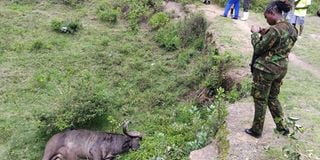County warns of anthrax infection after residents slaughter bufallo in Nakuru West

KWS officer stands over one of the killed buffalos that had strayed from Lake Nakuru National park into Soimet village in Barut, Nakuru West on April 5,2025.
The Department of Public Health has warned about the consumption of uninspected meat, following the recent incident in Barut, Nakuru West sub-county, where residents were seen on social media dividing buffalo meat amongst themselves.
The buffalos are alleged to have strayed from Lake Nakuru National park. Kenya Wildlife Service officers were able to gun down two of four of the animals.
The said animals are reported to have injured a woman, and in anger, residents decided to indulge in a scramble and partition of its meat.
According to authorities, handling or consuming meat from animals without proper inspection poses serious health risks, as it is impossible to ascertain its safety for human consumption.
In an interview with Mtaa Wangu over the phone, Elizabeth Kiptoo, Director of Public Health, says one of the primary concerns associated with consuming uninspected meat is the risk of zoonotic diseases, particularly anthrax.
Anthrax is a bacterial disease that affects both animals and humans. It is often transmitted through contact with infected animal products or consumption of contaminated meat.
“Handling or consuming meat from animals that have not been inspected poses serious health risks. We cannot be sure whether such meat is safe for human consumption,” says Dir. Kiptoo adding that the consumption of meat from animals that have died unexpectedly or been slaughtered without proper inspection can lead to dangerous infections.
She raises concern, noting that there have been sporadic cases of anthrax in humans after they consume meat from an animal that has died or they slaughter, unknowingly.
“We have mapped high-risk areas for the same and one of the areas is around the park in Nakuru East and West sub-counties and areas around Rongai. These areas have been reporting cases of anthrax occasionally,” she says.
In 2015, Nakuru experienced a massive anthrax outbreak that resulted in the deaths of rhinos and buffaloes in Lake Nakuru National Park.
Dir. Kiptoo recalls the incident, noting, “The infection spread to domestic animals, and a few individuals were infected after unknowingly consuming or handling meat from these infected animals. We did not experience cases of anthrax transmission from wild animals consumed or from contact with wildlife. This, however, does not mean they are safe for consumption.”
Kiptoo urges the public to refrain from consuming meat from uninspected or deceased animals.
“We call on the public to avoid eating meat from uninspected animals or animals that have died unexpectedly. If you encounter such animals, please report the case to the Department of Livestock and Veterinary Services for assistance on proper handling,” she advises.
Anthrax symptoms vary, but common symptoms include skin sores, fever, fatigue, and blood oozing from body openings, among others.


